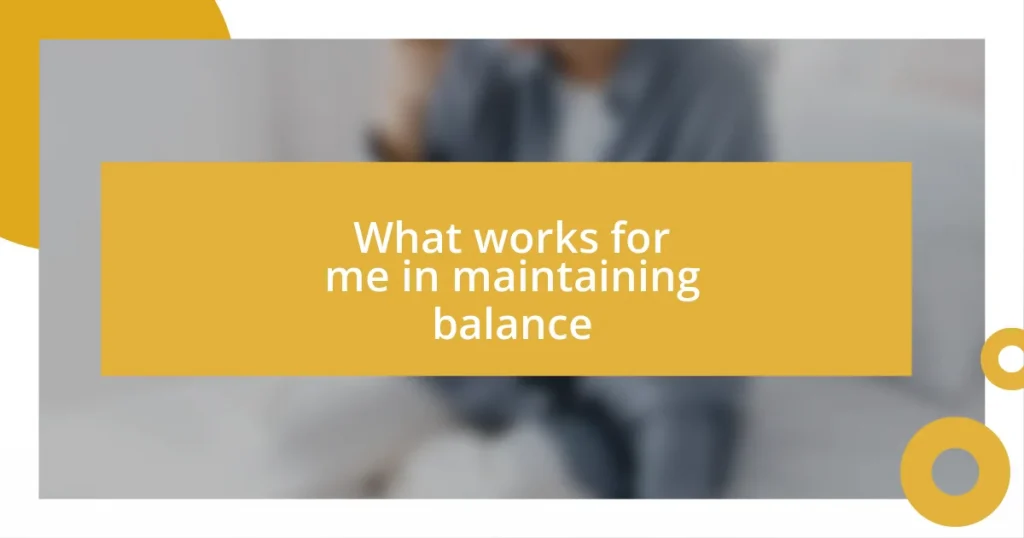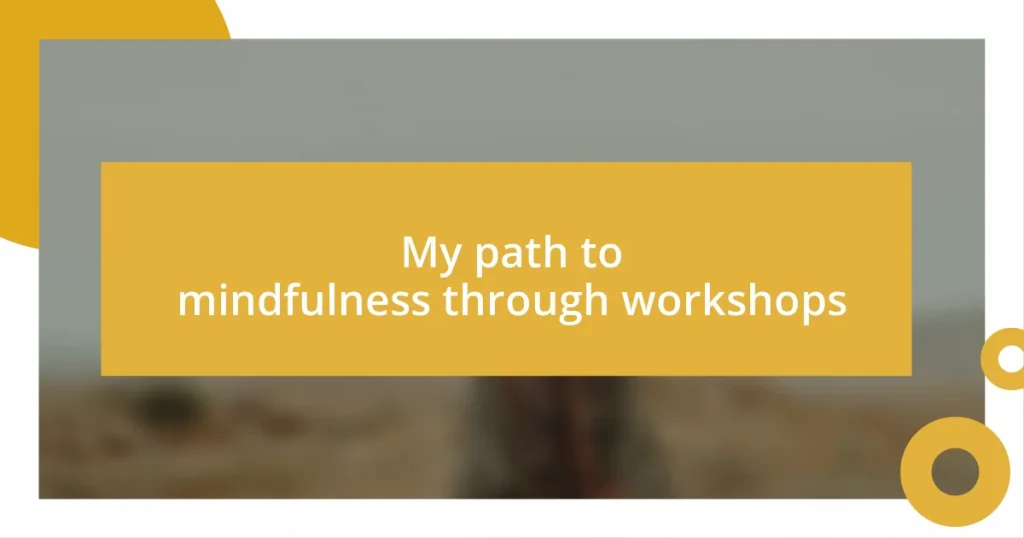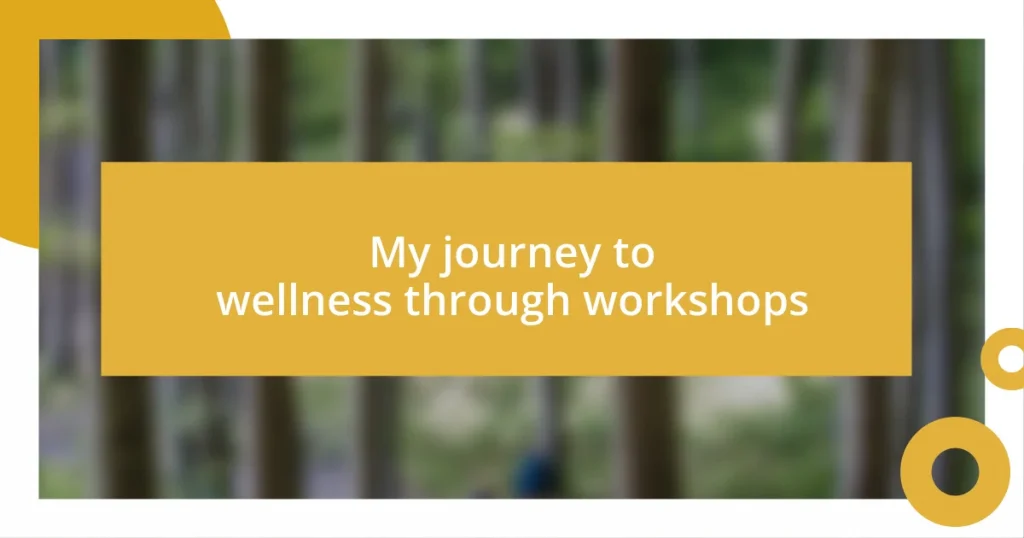Key takeaways:
- Establishing personal balance requires trial and error, aligning activities with core values, and setting clear boundaries.
- Creating a structured routine provides predictability, allows for flexibility, and fosters spontaneity in daily life.
- Effective stress management techniques, self-care practices, and realistic goal-setting are essential for maintaining overall well-being and balance.
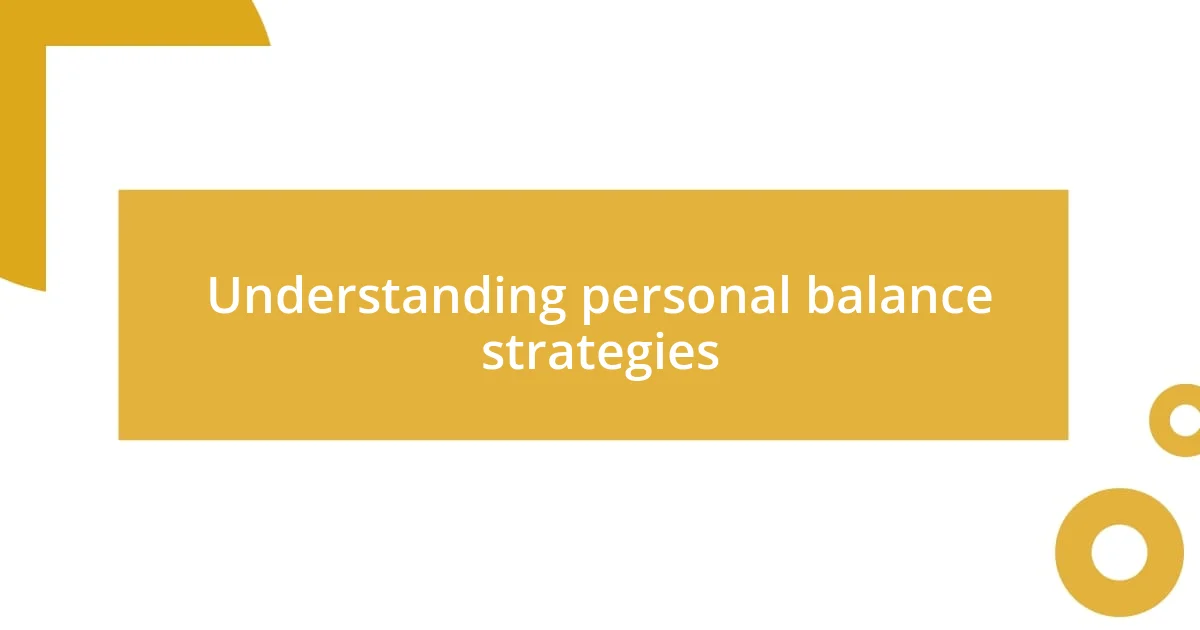
Understanding personal balance strategies
Finding personal balance isn’t a one-size-fits-all approach; it often requires a bit of trial and error. I remember my early days of trying to juggle work, family, and my own interests—it felt like I was always one breath away from tipping over. One day, I decided to set aside my Sundays as ‘me days.’ This simple shift transformed my week, giving me the time to recharge in a way that worked for me.
Reflecting on this, I realized that balance isn’t just about managing time but also about aligning my activities with my core values. For instance, incorporating mindfulness into my daily routine has been a game-changer. Have you ever felt the magic of being fully present in a moment? That’s how I felt when I started practicing meditation—it anchored my hectic days and provided clarity amid chaos.
I also learned to establish boundaries, both at work and home. Inviting friends over for a game night instead of scrolling through emails was liberating. What small change could you make today to claim that balance? For me, saying “no” became a powerful tool in honoring my time and energy, enabling me to engage fully in the things I love.
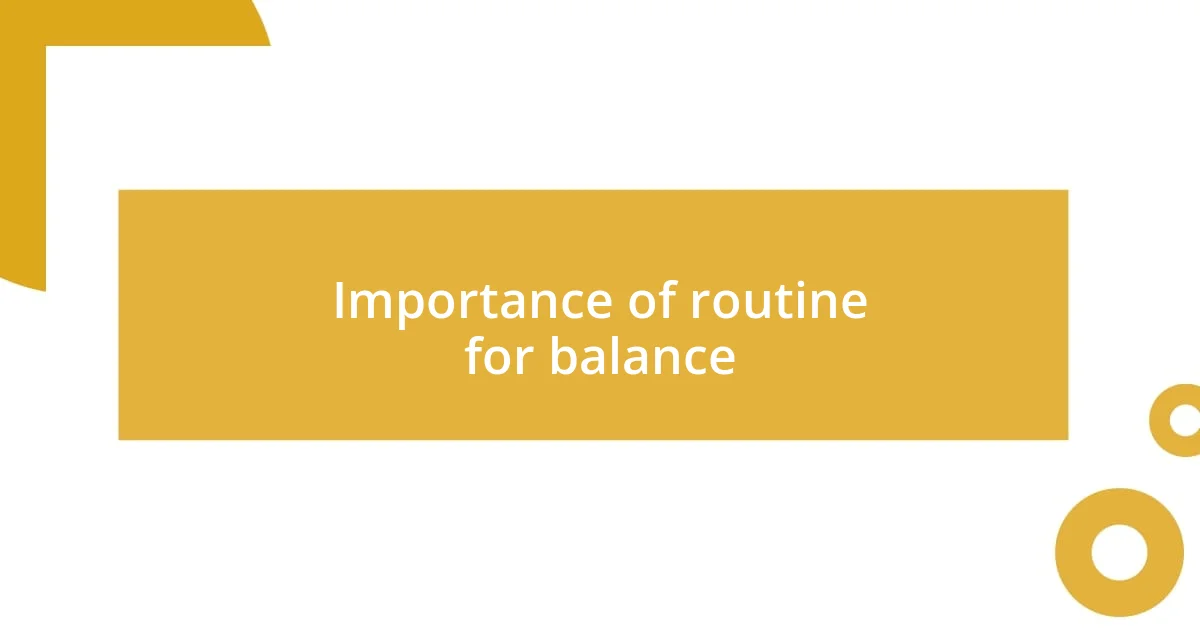
Importance of routine for balance
Establishing a routine plays a crucial role in maintaining balance in our lives. When I began to implement a structured schedule, I noticed how much more at ease I felt. There’s something comforting about knowing what to expect, and those predictable rhythms helped me allocate time for work, family, and personal interests without overlapping chaos.
In my experience, routines can act like anchors in the unpredictable sea of daily life. For example, I set a morning ritual that includes a cup of coffee while reviewing my goals for the day. This small act sets a positive tone and keeps me focused. Have you ever tried something similar? It’s fascinating how just a few consistent habits can create a foundation that supports various aspects of your life.
Additionally, a well-defined routine allows for flexibility. While it might seem counterintuitive, having a structure frees me up to be spontaneous when opportunities arise. I remember a time I was invited for an impromptu hike with friends. Because I had my tasks organized, I could easily embrace that moment without stressing about unfinished work. Routines don’t have to feel confining; they can actually pave the way for more enjoyable experiences.
| Aspect | Benefits |
|---|---|
| Structured Schedule | Provides a sense of calm and predictability. |
| Morning Rituals | Keeps focus and sets a positive tone for the day. |
| Flexibility Through Routine | Allows for spontaneity and enjoyment of new opportunities. |
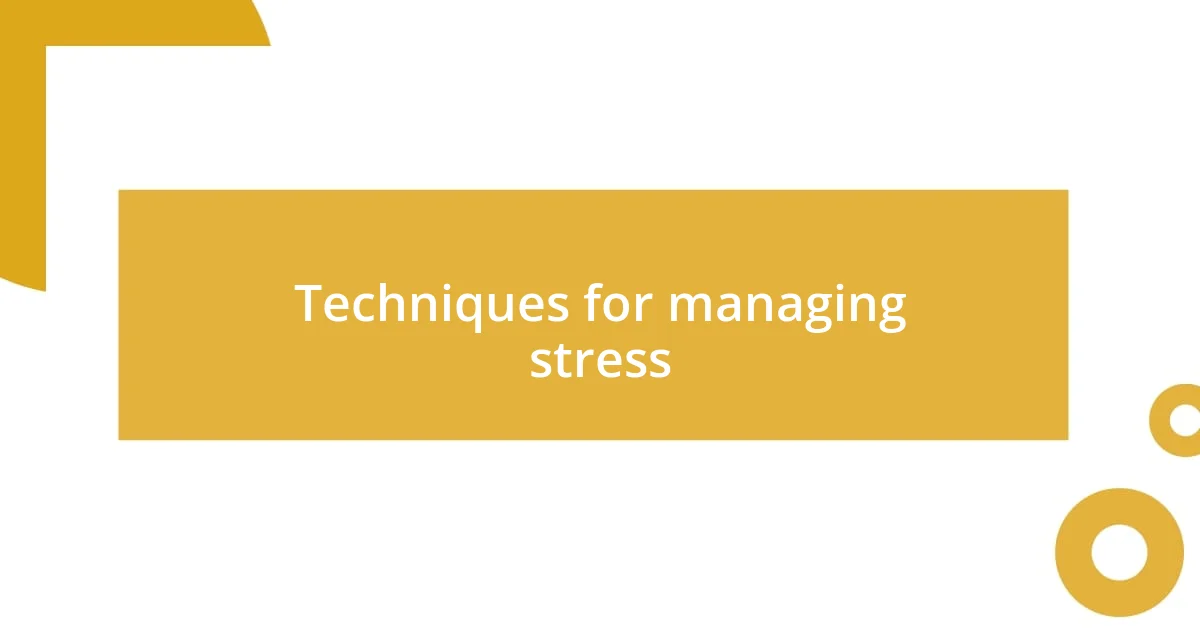
Techniques for managing stress
Maintaining balance requires effective stress management techniques that resonate with our individual needs. One powerful method I’ve found is incorporating physical activity into my routine. Whenever I feel overwhelmed, even a brisk walk or a quick workout can shift my mood almost instantly. I recall a particularly challenging week when I dedicated just 20 minutes a day to exercise; the tension melted away, and I felt rejuvenated.
Here are some techniques for managing stress that have worked for me:
- Deep Breathing Exercises: Simple yet effective, they can ground you in moments of chaos.
- Journaling: Writing down my thoughts shows me patterns and helps clear mental clutter.
- Mindfulness Practices: Engaging fully in the present moment transforms how I handle stress.
- Digital Detox: Taking breaks from screens can significantly reduce anxiety levels.
- Nature Escapes: Even short outings in nature help me feel grounded and refreshed.
Finding what resonates with you can make all the difference in your stress levels. Whether it’s trying a new exercise or simply stepping outside for fresh air, the key is to discover techniques that bring you peace.
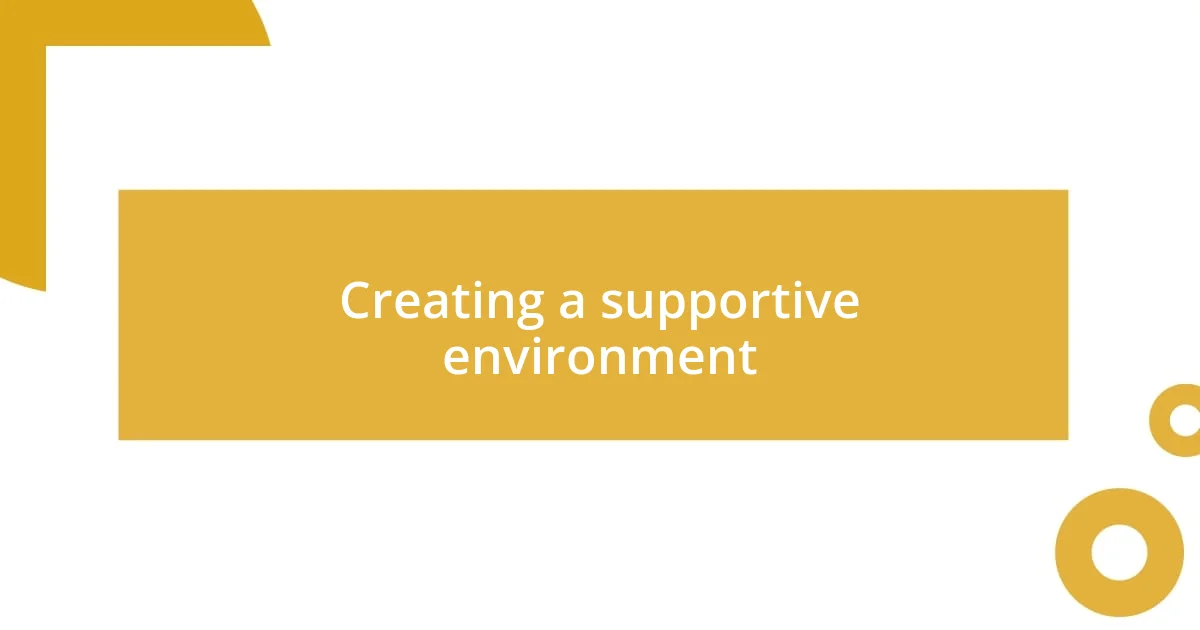
Creating a supportive environment
Creating a supportive environment has a profound effect on maintaining balance in life. I’ve learned that surrounding myself with positive influences makes a noticeable difference in my overall well-being. For instance, I chose to spend more time with friends who uplift me. Have you ever noticed how a simple conversation with a supportive friend can lighten your mood? It’s no surprise that the right company nurtures resilience.
When I think of support, I also consider my workspace. I’ve made it a priority to create a clutter-free, inviting area that fosters creativity and focus. Believe me, the energy of my surroundings directly impacts my productivity. When I have plants around, or even just a few personal mementos, I feel more grounded and inspired to tackle my tasks. It’s like setting the stage for my best self to shine through.
Lastly, establishing clear boundaries is a vital part of that supportive framework. Early in my career, I struggled with saying no, which led to burnout. But as I learned to prioritize my time and energy, I noticed a remarkable shift. It’s empowering to recognize when to step back and recharge, don’t you think? Boundaries are not just limits; they’re a way to honor my needs and create space for what truly matters.
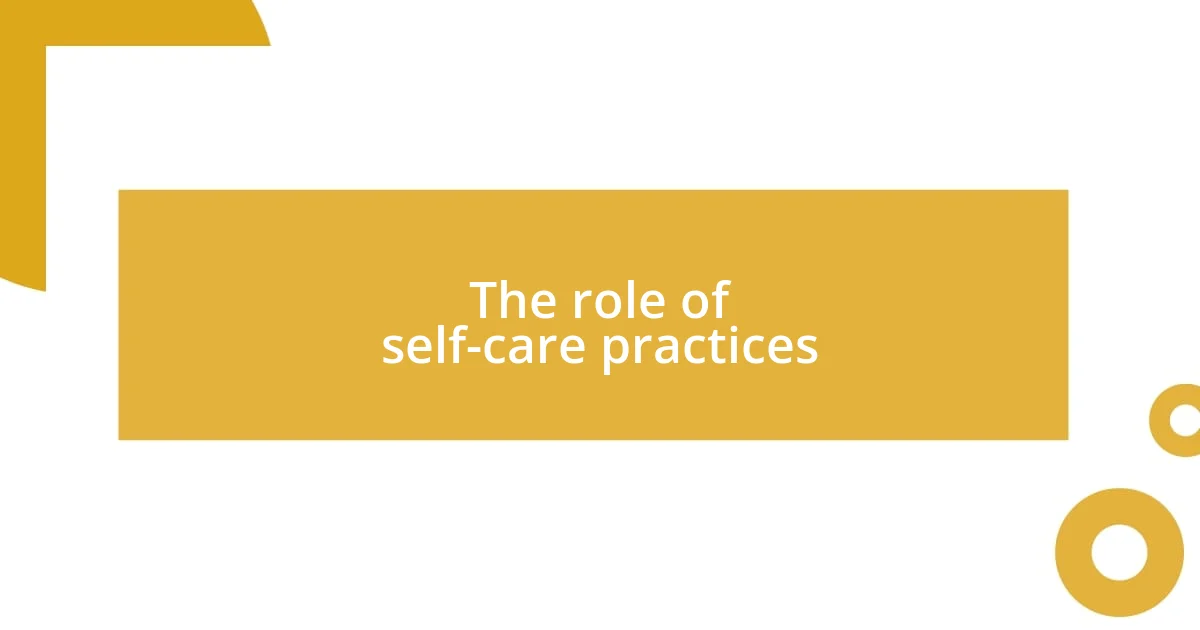
The role of self-care practices
Self-care practices play a crucial role in maintaining balance, and I can’t emphasize enough how personal these practices can be. For me, setting aside time for a soothing bath or indulging in a good book has been transformative. I remember a particularly hectic month when I felt constantly rushed; carving out just 30 minutes in the evening to unwind made me feel more centered and less like a ship adrift. Isn’t it amazing how something so simple can reframe your entire day?
Another aspect of self-care that has profoundly impacted my life is the art of saying “no.” I used to fill my schedule with commitments out of a sense of obligation, which left me feeling drained. When I finally started prioritizing my own needs and limiting my engagements, I found more joy in the activities I chose to pursue. Have you ever felt the weight lifted when you decide to put yourself first? It’s a liberating feeling that recharges my spirit.
Additionally, I’ve discovered the power of creative self-expression. Whether it’s painting, writing, or even cooking a favorite recipe, engaging in these activities allows me to reconnect with myself. I still remember creating a chaotic painting during a particularly stressful week; it was messy and vibrant, just like my emotions at that moment. The act of creation was cathartic, serving as a reminder that self-care isn’t just about relaxation—it’s also about honoring who we are and what we feel. Don’t you think embracing creativity can be one of the most fulfilling forms of self-care?
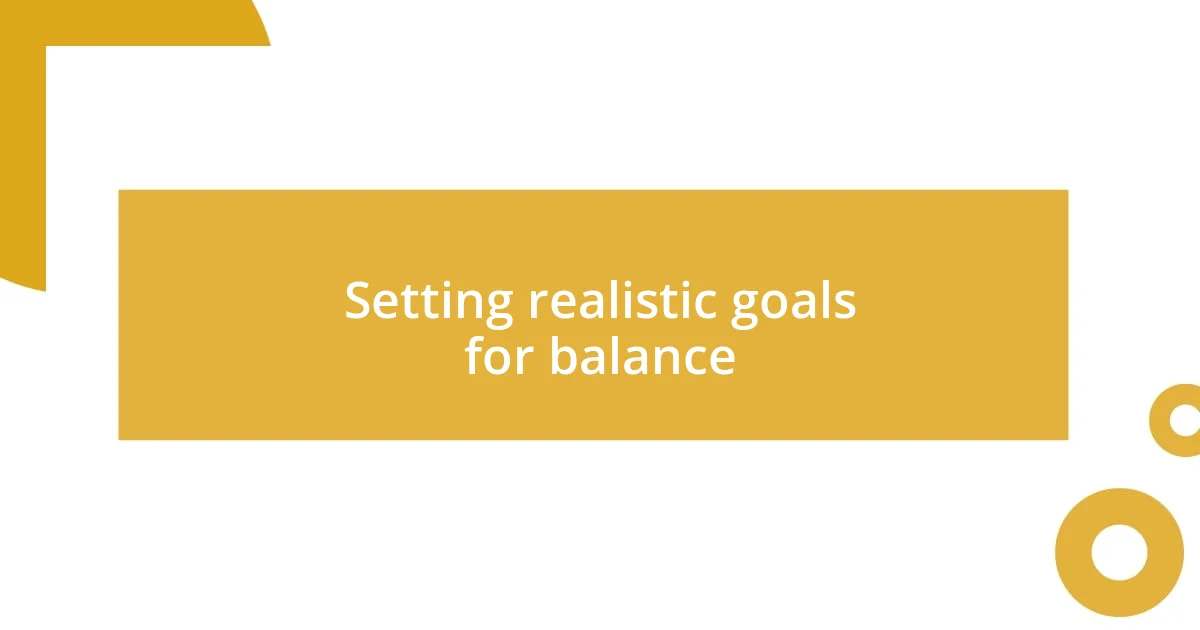
Setting realistic goals for balance
Setting realistic goals for balance is key in my journey toward overall well-being. I’ve learned that aiming for achievable milestones keeps me motivated and prevents that daunting feeling of overwhelm. For example, instead of committing to an hour of exercise every day, I started with just 15 minutes. That small shift made all the difference, allowing me to gradually build a routine without adding unnecessary pressure.
I often reflect on how every time I’ve set an unrealistic goal, it led to disappointment rather than growth. A few years ago, I thought I could balance a full-time job, a side project, and a social life all at once. It became clear that I was overextending myself, resulting in stress and fatigue. By breaking those aspirations down into digestible pieces, I realized it’s about quality over quantity. Have you ever had that “aha” moment when you finally understood that taking one step at a time is the secret sauce?
In my experience, being flexible with my goals has been a game changer. Life is unpredictable, isn’t it? There were times when I aimed for regular meditation, only to find myself too busy or restless. Allowing myself to adapt my goal, even if it meant less frequency, made me appreciate those moments even more when they did happen. Recognizing that balance isn’t a fixed state but a moving target helps me navigate the ups and downs of everyday life. How do you adjust your goals to stay balanced?
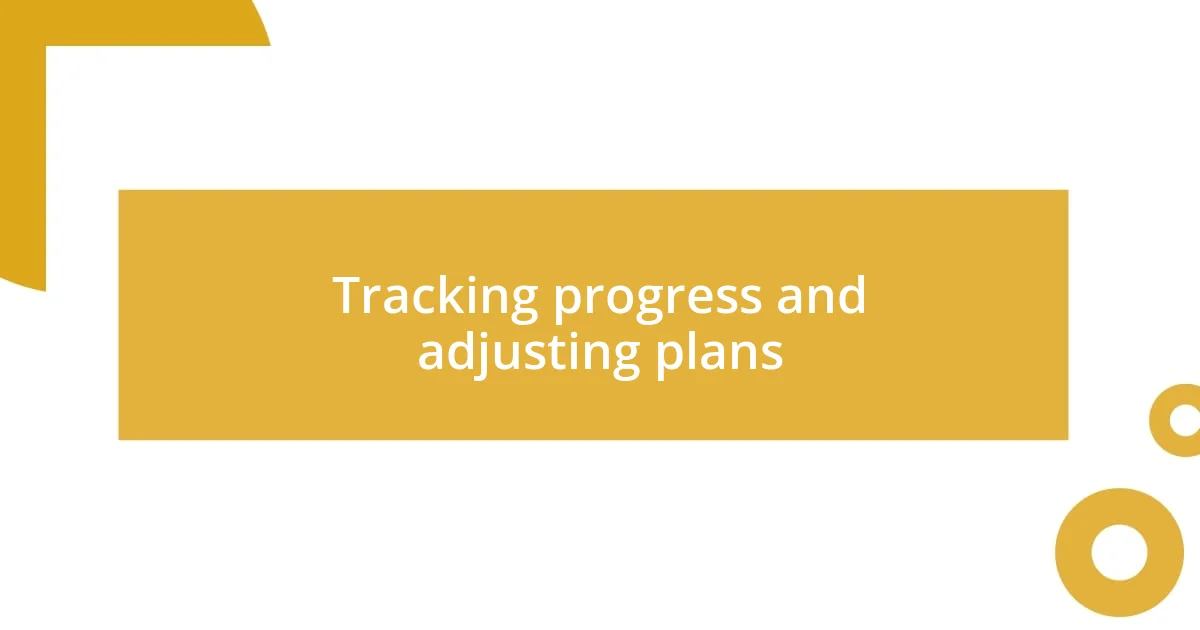
Tracking progress and adjusting plans
Tracking my progress has become a vital part of my routine when it comes to maintaining balance. I like to keep a simple journal where I jot down my daily achievements, no matter how small. Just the other week, I noted how I managed to stick to my meditation practice three days in a row, and it felt like a significant victory. Doesn’t it feel good to see the tangible results of your efforts?
Adjusting my plans is equally important. Life can throw unexpected curveballs, making it essential to be flexible. Not long ago, I had to shift my focus away from a particular fitness goal because of some back pain. Instead of feeling defeated, I embraced a gentler approach through yoga and stretching. Have you ever had to pivot your plans in a way that ended up being more beneficial than you initially thought? That’s the beauty of being adaptable.
Finding the right balance also requires me to evaluate what’s truly working and what isn’t. I recently revisited my evening routine because staying up late was affecting my morning mood. By tracking my sleep patterns and noticing my energy levels, I opted to wind down earlier and create a more peaceful environment. It’s amazing how simply adjusting one part of my day can lead to such positive changes overall, don’t you agree?










